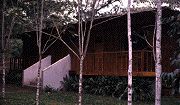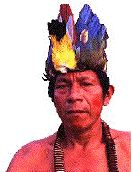Amazon Interactive
The Ecotourism Game

Build a new tourist lodge
 Tourists praise
the new lodge as clean and comfortable. A few complain about the generator
noise at night, but most are willing to give up the sounds of the night
forest for electric lights and ceiling fans. The cultural performances are
given in a building specially designed for them, complete with a lighting
and sound system. Tourists praise
the new lodge as clean and comfortable. A few complain about the generator
noise at night, but most are willing to give up the sounds of the night
forest for electric lights and ceiling fans. The cultural performances are
given in a building specially designed for them, complete with a lighting
and sound system.
Tourism has replaced agriculture as the main economic activity
in the community. Most Quichua still work in their fields, but only to grow
food for household consumption and a bit more to sell. Most of their time
is spent cooking and cleaning for tourists. Most enjoy the camaraderie of
this work, since they can spend more time together than they could when
they worked in the fields.
 The type of tourist who comes to the community
has changed. No longer the young adventurer, tourists are older now and
less interested in personal contact with the Quichua. Few speak Spanish
anyway. Most simply want to photograph the older men in traditional grass
skirts and feed the pet toucan in the garden. They applaud the cultural
program but never ask whether these traditions are maintained outside of
the tourism project The type of tourist who comes to the community
has changed. No longer the young adventurer, tourists are older now and
less interested in personal contact with the Quichua. Few speak Spanish
anyway. Most simply want to photograph the older men in traditional grass
skirts and feed the pet toucan in the garden. They applaud the cultural
program but never ask whether these traditions are maintained outside of
the tourism project
The Quichua have noticed the change in the tourists, and they
no longer look forward to tourist visits as they once did. Tourism is their
job now. They try to do it well, but they give it no more thought once the
day is over. They are making more money than ever. Several people have purchased
televisions and VCRs, renting videos every week when they take the canoe
into the nearest town. Almost everyone has at least a radio now, if not
a stereo. Every house has music playing.
Fortunately, few tourists notice. Most rarely leave the tourist
compound to walk in the rainforest, preferring instead to stay by the new
pool at the lodge.
| Though tourism is profitable, most Quichua continue to tend to their crops. The need for rich soil leads many of your neighbors to clear half a
hectare for new crops. However, deforestation is held at a minimum due to the ecotourism project. |
|
 |
|
|
 |
|
Tourism has become a strong and reliable source of income, doubling the annual income for most Quichua. Most people can even afford to send their children to
school in the provincial capital. |
|
Congratulations!
The ecotourism project is widely considered a success. Some
Quichua regret the way that the community now is focused on tourist services
rather than traditional Quichua activities, or at least demonstrating traditional
Quichua activities to tourists. Other regrets are those that come with progress
in any form: the children speak Spanish more than Quichua, the old knowledge
of the rainforest is not being passed down to new generations.
But you have avoided the mistakes made by other Quichua communities
with their ecotourism projects. You have helped preserve Pangayacu's remaining
rainforest and ensured the survival of the community.
This game is based on research into a Quichua ecotourism project
in Río Blanco, Ecuador. Learn more about it in at Ecotourism
Research and Other Adventures
|

![]()
 Tourists praise
the new lodge as clean and comfortable. A few complain about the generator
noise at night, but most are willing to give up the sounds of the night
forest for electric lights and ceiling fans. The cultural performances are
given in a building specially designed for them, complete with a lighting
and sound system.
Tourists praise
the new lodge as clean and comfortable. A few complain about the generator
noise at night, but most are willing to give up the sounds of the night
forest for electric lights and ceiling fans. The cultural performances are
given in a building specially designed for them, complete with a lighting
and sound system. The type of tourist who comes to the community
has changed. No longer the young adventurer, tourists are older now and
less interested in personal contact with the Quichua. Few speak Spanish
anyway. Most simply want to photograph the older men in traditional grass
skirts and feed the pet toucan in the garden. They applaud the cultural
program but never ask whether these traditions are maintained outside of
the tourism project
The type of tourist who comes to the community
has changed. No longer the young adventurer, tourists are older now and
less interested in personal contact with the Quichua. Few speak Spanish
anyway. Most simply want to photograph the older men in traditional grass
skirts and feed the pet toucan in the garden. They applaud the cultural
program but never ask whether these traditions are maintained outside of
the tourism project
